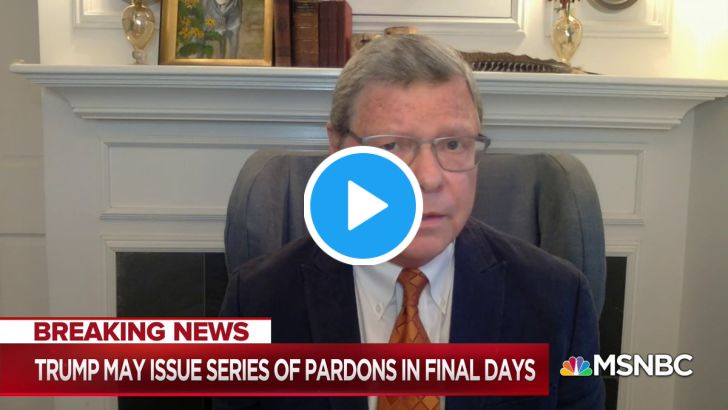Please Join Us Tonight:
The most impressive thing about this tweet is that it’s from 2015, because it seems very much on the nose these days.
ICYMI: Trumpist activists are now telling Republicans to boycott the January 5 senatorial run-off, because…. leopards.
Really, people, marvel at the four-dimensional chess here.
Rich Lowry makes an obvious point here, when he notes that “there is no evidence that Lin Wood and Sidney Powell are secretly working for the Democratic National Committee, but no one has definitively disproved it, either.”
This is, however, what you get when you bring cranks, grifters, crackpots and hacks into your inner circle and elevate their national profiles.
Sometimes it does, indeed, come back to eat your face.
But this is also what you get when you elect someone as president, who is himself both a crackpot and a fabulist, a chronic liar who has his own fascination with conspiracy theories.
When the GOP embraced the candidate of Birtherism, what did they think would happen? When they looked the other way when he spun made up tales about hidden wiretaps, mysterious servers, and deep state plots, where did they think this was going?
Newt Gingrich, for one, appears to be very, very shocked.
Did they really think the face eating leopards wouldn’t come for them?
The Most Important Presidential Speech Evah. Yeah, don’t bother. 46 minutes of self-pity, petulance, deceit, and bullshit.
But at least he didn't declare martial law. So, hey, there's that.
Married to a lie. My latest column for MSNBC looks at where the GOP might be going.
Indeed, Trump’s insistence that he was stabbed in the back could shape right-wing politics for decades. In the short term, there is no longer any easy exit strategy for Republicans. Trump’s denialism won’t end with the certification of the state votes; it won’t end with the counting of the Electoral College votes; and it won’t end on Jan. 20 with his departure from the White House.
Trump reportedly will boycott the inauguration and may stage a counter-event to announce that he is running in 2024. (Speaking of litmus tests: Will Vice President Mike Pence attend the formal inauguration or the Trumpian anti-inauguration? What will other GOP senators do?)
What would another Trump campaign mean? If he says he’s running, Republicans will find themselves married to his election trutherism for another four, or perhaps even eight, years. Trump’s lies about fraud will be central to that campaign — a chant at every rally; the juice behind massive fundraising appeals; the centerpiece of any post-presidential media enterprise; and the subject of thousands of tweets.
There are scattered signs of resistance, but if this is going to be yet another test of the GOP’s integrity, it’s probably best to keep your optimism in check. After four years of Trump, the habit of ignoring reality is no longer simply a reflex; it is now at the center of the right’s political culture. Indeed, ignoring the reality of the coronavirus was a dress rehearsal for ignoring the reality of an American election.
And like clockwork:
Exit take: Is it possible? “Mike Pence Backs Away From the Trump Election ‘Fraud’ Train Wreck”.
“The vice president doesn’t want to go down with this ship…and believes much of the legal work has been unhelpful.”
Some thoughts on Hope.
When I was young I thought of Hope as a parti-colored bird; elusive but filled with joyful portent.
Now I think of Hope as a guy in a rusty Chrysler Imperial trying to sell me the same cut-rate crack he conned me into buying last week.
Sometimes, I worry that I’m getting too cynical.
But after the last five years the cynicism is hard won. All I have to do is look at the photos on the wall of my office — all of the politicians and “friends,” who once represented the future. And we know how that turned out. Spend enough time in this business and disillusionment becomes your constant companion. After the long soul-crushing slog of the last four years, you learn to be leery of putting your hope in princes.
But I started thinking about the idea of hope this morning, as I read Bill Kristol’s piece in today’s Bulwark. He paints a picture of a possible future that I very much want to believe.
“Could America deal with this crisis by peacefully ushering out the old era and shaping a new one,” he writes, “one that renews the institutions of liberal democracy, that restores a decent civil life, that revives a healthy liberalism and creates a sound conservatism, that enables a new governing center in the midst of a reasonable and deliberative politics?”
Sounds good. Won’t happen, right? I find myself struggling against going there again, because I’m not optimistic.
But the late Rabbi Jonathan Sacks reminded us that “Optimism and hope are not the same. Optimism is the belief that the world is changing for the better; hope is the belief that, together, we can make the world better.”
Hope actually requires courage.
Optimism is a passive virtue, hope an active one. It needs no courage to be an optimist, but it takes a great deal of courage to hope. The Hebrew Bible is not an optimistic book. It is, however, one of the great literatures of hope.
Elsewhere he wrote:
“Hope is not costless in the way that optimism is. It carries with it a considerable price. Those who hope refuse to be comforted while the hoped-for outcome is not yet reached. Given their history of suffering, Jews were rarely optimists. But they never gave up hope. That is why, when the prophets saw evil in the world, they refused to be comforted.”
Quick Hits
1. The Trump Pardon Spree
Kim Wehle, in today’s Bulwark:
Over the past couple of days, we learned that his “lawyer” Rudy Guiliani reportedly discussed a preemptive pardon with Trump; that Trump has floated pardons of his three eldest children; and that since August, the Department of Justice has been investigating a potential pardon-for-pay bribery scheme that it inadvertently uncovered in conducting a sweep of materials obtained through an unrelated subpoena.
It would not be unreasonable to expect pardons of a slew of other Trump loyalists, including:
Paul Manafort, whom a jury convicted of tax and bank fraud;
Steve Bannon, Trump’s former White House strategist who was arrested and charged with defrauding donors to a nonprofit supposedly involved in building the elusive southern border wall;
Rick Gates, who worked with Manafort but cooperated with prosecutors after pleading guilty to lying to federal agents and other crimes; and
George Papadopoulos, a former foreign policy advisor on the 2016 Trump campaign, who also pleaded guilty to lying to investigators in connection with former Special Counsel Robert Mueller’s probe of Russian interference on Trump’s behalf in 2016.
2. Bill Barr’s Very “Special” Episode
Adam White writes that the attorney general wants the benefits of special counsel status for John Durham, but without bearing the costs. He’s not alone.
In what might prove to be his last significant act as attorney general, William Barr appointed John Durham to be a special counsel, in order to continue the Trump administration’s investigation into the Obama administration even after Trump himself leaves office. Critics immediately recognized a legal glitch in Barr’s memo appointing Durham, but that glitch will not negate Durham’s appointment. In that respect, the glitch is less significant than it might seem. Yet, at the same time, it is also more significant than it seems.
When Attorney General Barr announced on Tuesday that he had, back in October, appointed Durham to be a special counsel, his memo vested Durham with extraordinary powers and independence from oversight as he continues his investigation into the Obama administration’s Crossfire Hurricane investigation of the 2016 Trump campaign. Barr made clear that Durham is also investigating “the investigation of Special Counsel Robert S. Mueller, III.” And other language in the memo (“including, but not limited to”) suggests that Durham may investigate even more, too.
Cheap Shots
“Cowards”
This went well.
I had some thoughts.
Deep Thoughts
Vaccines Don’t Protect People. Vaccination Does.
David Shaywitz writes in today’s Bulwark:
Lack of trust in childhood vaccinations—spurred in large measure by fraudulent, subsequently retracted reports that the vaccinations were associated with autism—has resulted in a dispiriting degree of what’s now termed “vaccine hesitancy”observed across the political spectrum. And popular books playing up the idea that vaccines aren’t “natural” haven’t helped. Because of this lack of trust, an estimated 42,000 adults and 300 children die annually in the U.S. from vaccine-preventable illness.
On top of existing anxieties about vaccines we can now layer on the trust issues associated with our current partisan era. Some people who oppose Donald Trump may worry about the safety of a vaccine developed during Trump’s administration. And some who support Donald Trump may be suspicious of a vaccine distributed by a government run by the other party. This is not a fanciful concern. Vaccination-related conspiracies are also common on QAnon and Trump himself was once a vaccine-skeptic.











